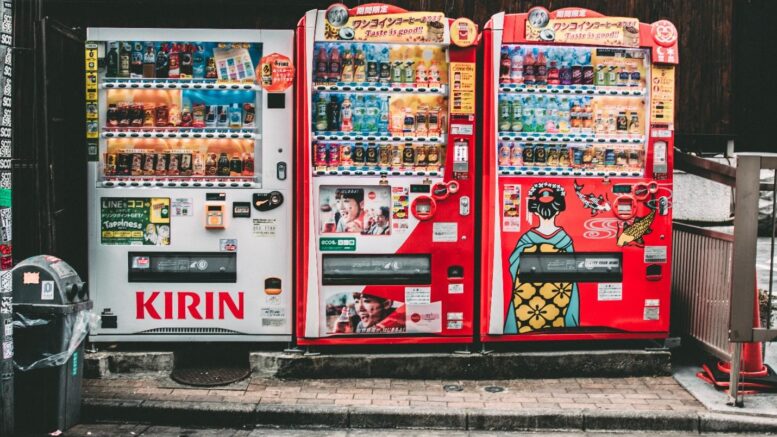The digital age has ushered in remarkable transformations across numerous sectors, and vending machines are no different. Today, these machines have transcended their initial design as simple coin-operated dispensers. With the integration of digital technology, vending machines now deliver a broader range of products and a more personalized, convenient experience for users. This article will delve into how these machines have adapted in the digital era, discussing the digital innovations and their implications for both consumers and businesses.
The Traditional Vending Machine: A Brief History
Tracing back to the first century AD, the history of vending machines began with a Greek engineer’s invention that dispensed holy water for a coin. By the 1880s, commercial vending machines made their debut in London, selling postcards. Throughout the 20th century, these machines expanded their offerings, from beverages and snacks to cigarettes and newspapers. However, they were primarily basic, with little room for customization or enhancement. The 21st century’s digital surge, though, set the stage for a dramatic evolution in the world of vending machines.
The Digital Transformation: Vending Machines in the 21st Century
Incorporating digital technologies has redefined the essence of vending machines in the 21st century. Contemporary machines come equipped with touch screens, cashless payment systems, and in some instances, artificial intelligence capabilities. These advanced vending machines can track inventory in real-time, offer tailored recommendations, and provide interactive interfaces for users. The marriage of vending machines and digitalization has enhanced user experiences and has carved new avenues for businesses to explore and capitalize on.
How Digitalisation Enhances User Experience
Digital advancements have significantly enriched the vending machine user experience. Touch screen interfaces have simplified navigation, cashless payments have eradicated the hassle of coins, and personalized suggestions based on purchase histories have rendered machines more engaging. Moreover, real-time stock tracking prevents disappointments related to unavailable items. The transformative power of the digital era has thus reshaped user interaction with vending machines.
The Impact of Digital Vending Machines on Business Operations
From a business perspective, digitalization has revolutionized vending machine operations. Real-time inventory monitoring optimizes efficiency and minimizes manual stock-checking. Cashless transactions expedite and simplify the payment process. Personalized recommendations can strategically boost sales by promoting certain products. The digital enhancements not only improve user experience but also bolster business growth and efficiency.
The Future of Vending Machines: Predictions and Possibilities
Peering into the future, vending machines’ digital evolution shows no sign of slowing down. Predictions suggest integrations with voice recognition, augmented reality, and even more advanced artificial intelligence. Machines could further personalize recommendations by analyzing and learning from user behavior. The harnessing of big data might provide businesses with deeper insights into customer preferences, refining their product and service offerings. This forward trajectory hints at a transformative future, reshaping our shopping habits and interactions with automated systems.

Conclusion: Embracing the Digital Age
To sum up, the digital revolution has reimagined the realm of vending machines, converting them from basic dispensers to interactive, technologically advanced platforms. The integration of digital tools has amplified user experience and created operational efficiencies for businesses. As we navigate deeper into the digital age, the horizon promises even more innovations, potentially reshaping our interactions with machines. In this era, vending machines stand as a testament to the power and potential of digital evolution.
Sustainability and Digital Vending Machines
One of the defining hallmarks of our era is the growing emphasis on sustainability, and digital vending machines can play an essential role in this mission. As businesses and consumers become more eco-conscious, the vending machine industry is poised to lead the way in sustainable practices, leveraging digital technologies.
Reducing Waste
Digital vending machines can be designed to reduce waste. For instance, with real-time inventory tracking, businesses can optimize stock levels, ensuring products don’t expire and become waste. Moreover, machines can incorporate systems to recycle or compost packaging directly, or even incentivize customers for returning packaging for reuse.
Energy Efficiency
Modern digital vending machines can be equipped with energy-efficient components such as LED lighting, solar panels, and sensors to turn off power when not in use. Smart energy management systems can monitor and adjust power consumption, ensuring machines only use energy when necessary.
Eco-friendly Product Offerings
Digital interfaces allow for a broader range of product offerings. This provides an opportunity to stock vending machines with organic, local, or eco-friendly products. By providing information on the source and benefits of these products on the touch screen, customers can be educated about their purchases, potentially steering them toward more sustainable choices.
Digital Feedback and Engagement
Through their interactive interfaces, digital vending machines can engage users in sustainability initiatives. For instance, after a purchase, the machine could display the environmental savings of choosing a particular eco-friendly product or provide tips on recycling. Machines could also have feedback systems where consumers can suggest eco-friendly products or practices.
Collaboration with Environmental Initiatives
Vending machine businesses can integrate their digital platforms with environmental organizations. For instance, a percentage of the sales from the vending machine could be directed towards reforestation efforts or plastic cleanup initiatives. With digital technology, this can be tracked and displayed in real-time, providing consumers with a tangible connection to the positive impact of their purchase.
In conclusion, the fusion of digital technology with sustainability goals in the vending machine industry not only addresses current environmental concerns but also showcases a roadmap for how automated retail platforms can play a pivotal role in building a greener future.
Moreover, there’s a growing trend towards using recyclable or biodegradable packaging for products. This not only reduces waste but also encourages consumers to make eco-conscious choices. Some machines are even being equipped with recycling compartments, ensuring that users have an immediate option to dispose of packaging responsibly.
